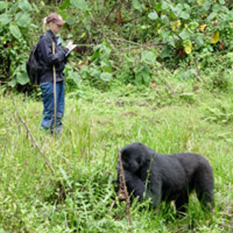Sarah Sawyer
Ph.D. AlumView all Alumni

Ph.D. 2012
Contact
Email: scsawyer@fs.fed.us
Research Interests
I am interested in the conservation of wildlife and other natural resources in human-modified landscapes. I am particularly interested in areas where multiple mandates and opposing short- and long-term interests make conservation decision-making complex. I currently work as the Assistant Regional Ecologist for the US Forest Service, Region 5. Our goal is to manage for multiple, often competing, ecological, social, and economic interests over 20 million acres of National Forest.
For my doctoral work at UC Berkeley I focused on conservation biology and wildlife ecology within the department of Environmental Science, Policy, and Management at UC Berkeley. For my dissertation work, I studied ecology, habitat selection, and conservation in Cross River gorilla habitat in Cameroon. I examined the effects of human-landscape interactions and ecological habitat traits on gorilla distribution and conservation planning. I also took an interest in International Environmental Law, and its implications for on-the-ground conservation efforts.
Before coming to Berkeley, I spent 3 years studying primates in Africa. Upon completing my bachelor’s and master’s degrees at Stanford University, I spent 4 months working for a chimpanzee rehabilitation and re-release project in Conkouati National Park, Republic of Congo. With local research assistants, volunteers followed re-released chimpanzees daily, studying their behaviors, feeding habits, and habitat usage. After leaving Congo, I came to live and work in Bwindi National Park, in Uganda, as research assistant to Dr. Martha Robbins of the Max Planck Institute in Leipzig, Germany. Dr. Robbins studies the socio- and feeing ecology of the critically endangered mountain gorilla. I collected data on one habituated group of mountain gorillas, trained and worked closely with local assistants, participated in a park-wide census of the mountain gorilla population, and worked alongside the Institute for Tropical Forest Conservation (ITFC) in Ruhija, Uganda. The work of Dr. Robbins and ITFC helped me learn effective ways to combine research and conservation agendas. After two years in Uganda, I returned to the states to begin my dissertation work at UC Berkeley in hopes of positively influencing wildlife conservation in Africa.